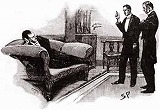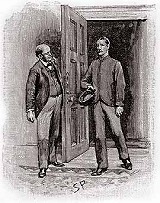“I fancy not. The thieves ransacked the library and got very little for their pains. The whole place was turned upside down, drawers burst open, and presses ransacked, with the result that an odd volume of Pope’s Homer, two plated candlesticks, an ivory letter-weight, a small oak barometer, and a ball of twine are all that have vanished.”
“What an extraordinary assortment!” I exclaimed.
“Oh, the fellows evidently grabbed hold of everything they could get.”
Holmes grunted from the sofa.
“The county police ought to make something of that,” said he; “why, it is surely obvious that- -”

But I held up a warning finger.
“You are here for a rest, my dear fellow. For heaven’s sake don’t get started on a new problem when your nerves are all in shreds.”
Holmes shrugged his shoulders with a glance of comic resignation towards the colonel, and the talk drifted away into less dangerous channels.
It was destined, however, that all my professional caution should be wasted, for next morning the problem obtruded itself upon us in such a way that it was impossible to ignore it, and our country visit took a turn which neither of us could have anticipated. We were at breakfast when the colonel’s butler rushed in with all his propriety shaken out of him.
“Have you heard the news, sir?” he gasped. “At the Cunningham’s, sir!”
“Burglary!” cried the colonel, with his coffee-cup in mid-air.
“Murder!”
The colonel whistled. “By Jove!” said he. “Who’s killed, then? The J. P. or his son?”
“Neither, sir. It was William the coachman. Shot through the heart, sir, and never spoke again.”
“Who shot him, then?”
“The burglar, sir. He was off like a shot and got clean away. He’d just broke in at the pantry window when William came on him and met his end in saving his master’s property.”
“What time?”
“It was last night, sir, somewhere about twelve.”
“Ah, then, we’ll step over afterwards,” said the colonel, coolly settling down to his breakfast again. “It’s a baddish business,” he added when the butler had gone; “he’s our leading man about here, is old Cunningham, and a very decent fellow too. He’ll be cut up over this, for the man has been in his service for years and was a good servant. It’s evidently the same villains who broke into Acton’s.”
“And stole that very singular collection,” said Holmes thoughtfully.
“Precisely.”
“Hum! It may prove the simplest matter in the world, but all the same at first glance this is just a little curious, is it not? A gang of burglars acting in the country might be expected to vary the scene of their operations, and not to crack two cribs in the same district within a few days. When you spoke last night of taking precautions I remember that it passed through my mind that this was probably the last parish in England to which the thief or thieves would be likely to turn their attention - which shows that I have still much to learn.”
“I fancy it’s some local practitioner,” said the colonel. “In that case, of course, Acton’s and Cunningham’s are just the places he would go for, since they are far the largest about here.”
“And richest?”
“Well, they ought to be, but they’ve had a lawsuit for some years which has sucked the blood out of both of them, I fancy. Old Acton has some claim on half Cunningham’s estate, and the lawyers have been at it with both hands.”
“If it’s a local villain there should not be much difficulty in running him down,” said Holmes with a yawn. “All right, Watson, I don’t intend to meddle.”

“Inspector Forrester, sir,” said the butler, throwing open the door.